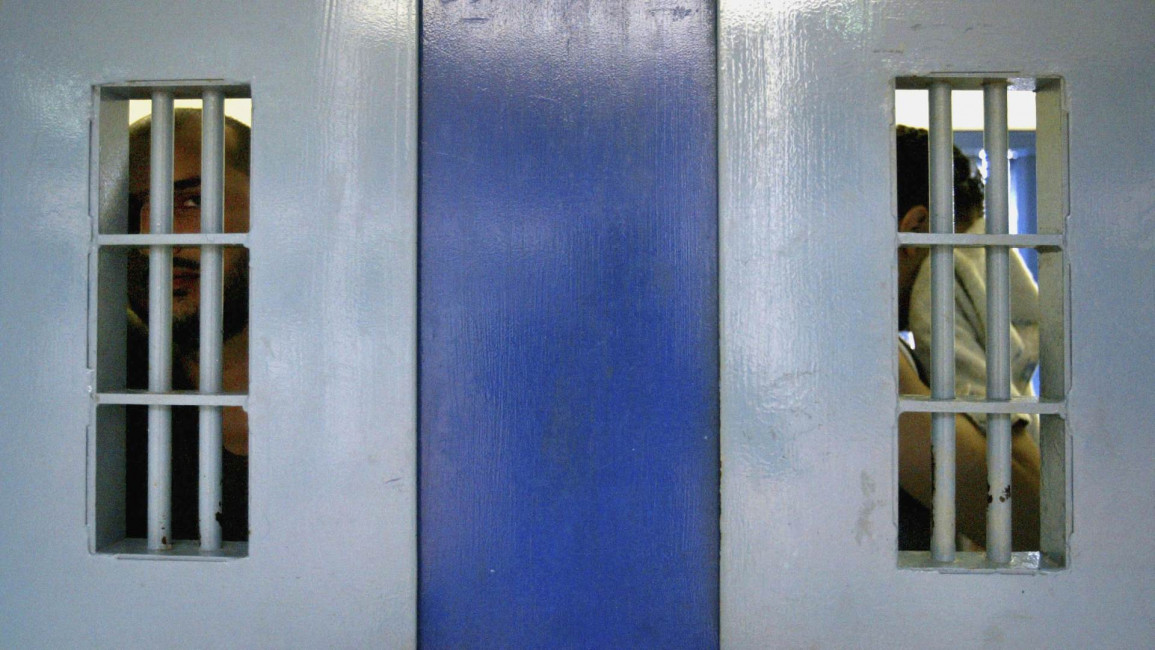Palestinian prisoners to wage hunger strike after suspension of family phone calls during coronavirus epidemic
Palestinian prisoners to wage hunger strike after suspension of family phone calls during coronavirus epidemic
A number of Palestinian detainees are set to launch a hunger strike, saying they have been deprived of any contact with their families since the coronavirus outbreak.
2 min read
Detainees went on hunger strike last year to demand phones be installed in prisons [Getty]
Palestinian inmates held in Israel's Hadarim prison are planning to launch an open-ended hunger strike in protest of what they have called an "escalataion of the Israeli authorities' policies of deprivation".
This includes the suspension of phonecalls to prisoners' families, according to the prisoner support organisation, the Palestinian Prisoner Club (PPC).
The group said that the Israeli prison authorities have exploited the conditions of the Covid-19 pandemic, establishing a number of excessive restrictions including the suspension of all family contact, including telephone calls.
Family visits have also been stopped since March, when Israel declared a state of emergency as the pandemic spread.
The strike is also to protest violations against sick prisoners at Ramle prison, where an outbreak of coronavirus was reported, as well as conditions in Damon prison.
Addameer, a fellow prisoner support organisation, has previously described Damon as being "characterised by its old, inadequate infrastructure, lack of proper sanitary services, of privacy and of basic hygiene needs".
The group added that it "was never an adequate place for human beings to live in".
PPC did not say how many prisoners were planning to take part in the protest, however, mass hunger strikes among the Palestinian prisoner population are not uncommon.
Comment: Remembering Qalandia, Jerusalem's stolen airport
In April 2009, 400 prisoners launched an open-ended hunger strike in order to highlight a long list of demands for improved prison conditions, including better medical care, more family visits, and access to a public telephone.
The strike ended after eight days, after Israeli prison authorities agreed to install three phones in each facility, with prisoners allowed three 15-minute calls a week.
Follow us on Facebook, Twitter and Instagram to stay connected
This includes the suspension of phonecalls to prisoners' families, according to the prisoner support organisation, the Palestinian Prisoner Club (PPC).
The group said that the Israeli prison authorities have exploited the conditions of the Covid-19 pandemic, establishing a number of excessive restrictions including the suspension of all family contact, including telephone calls.
Family visits have also been stopped since March, when Israel declared a state of emergency as the pandemic spread.
The strike is also to protest violations against sick prisoners at Ramle prison, where an outbreak of coronavirus was reported, as well as conditions in Damon prison.
Addameer, a fellow prisoner support organisation, has previously described Damon as being "characterised by its old, inadequate infrastructure, lack of proper sanitary services, of privacy and of basic hygiene needs".
The group added that it "was never an adequate place for human beings to live in".
PPC did not say how many prisoners were planning to take part in the protest, however, mass hunger strikes among the Palestinian prisoner population are not uncommon.
Comment: Remembering Qalandia, Jerusalem's stolen airport
In April 2009, 400 prisoners launched an open-ended hunger strike in order to highlight a long list of demands for improved prison conditions, including better medical care, more family visits, and access to a public telephone.
The strike ended after eight days, after Israeli prison authorities agreed to install three phones in each facility, with prisoners allowed three 15-minute calls a week.
Follow us on Facebook, Twitter and Instagram to stay connected


![President Pezeshkian has denounced Israel's attacks on Lebanon [Getty]](/sites/default/files/styles/image_684x385/public/2173482924.jpeg?h=a5f2f23a&itok=q3evVtko)



 Follow the Middle East's top stories in English at The New Arab on Google News
Follow the Middle East's top stories in English at The New Arab on Google News


